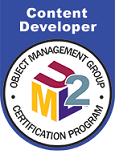Course Outline

Introduction
- Exam information
- Coverage table
- OMG Certified Professionals Directory
- Taking the exam (online or at a test center)
Why we model
- The value of modelling
- When do we model?
- When don't we model?
- Abstraction
- MDA introduction
- Domain model
- Model Value Analysis
The Class Diagram
Common Structure
- Type
- Dependency
- Namespace
- VisibilityKind (public, private, protected)
- MultiplicityElement
- Constraint
- Comment
Simple Classifiers
- PrimitiveType
- DataType
- Enumeration
- EnumerationLiteral
- Interface
- InterfaceRealization
- Signal
- Reception
Structured Classifiers
- Association
- Class
Classification
- Generalization
- Feature
- Structural Feature
- Behavioral Feature
- Property
- Operation
- Parameter
- AggregationKind (Composition, Aggregation)
Values
- LiteralBoolean
- LiteralInteger
- LiteralReal
- LiteralUnlimitedNatural
- LiteralNull
- LiteralString
- Opaque Expression
The Object Diagram
- InstanceSpecification
- Slot
The Package Diagram
Packages
- Package
- PackageImport
The Use Case Diagram
Use Cases
- UseCase
- Actor
- Include
The Activity Diagram
Activities
- Activity
- ActivityFinalNode
- ActivityParameterNode
- ControlFlow
- InitialNode
- DecisionNode
- FlowFinalNode
- ForkNode
- JoinNode
- MergeNode
- ObjectFlow
- ObjectNode
Actions
- Action
- CallBehaviorAction
- CallOperationAction,
- SendSignalAction
- AcceptEventAction
- Pin
- InputPin, OutputPin
- OpaqueAction
The Sequence Diagram
Interactions
- Interaction
- OccurrenceSpecification
- ExecutionSpecification
- ExecutionOccurrenceSpecification
- DestructionOccurrenceSpecification
- Lifeline
- Message
- MessageOccurrenceSpecification
- MessageSort
- MessageEnd
Common Behavior
- CallEvent
- SignalEvent
- Trigger
- OpaqueBehavior
The State Machine Diagram
State Machines
- StateMachine
- State
- Transition
- Pseudostate: choice, junction, initial
- FinalState
Requirements
Understanding of basic object-oriented concepts or basic UML knowledge is required.
Testimonials (6)
Focus on the goal and specificity of information, as well as a platform with test questions, where we could see what the exam looks like and what it involves.
Róża
Course - OCUP2 UML Certification - UML 2 Foundation Exam Preparation
Machine Translated
much of it. Preparation of training materials, planning and implementation of the training. Reference to real situations. Quizzes. The way Filip dealt with each muted microphone, you couldn't tell that it was online. Fully professional. I will recommend him to my company
Łukasz Cieciura
Course - OCUP2 UML Certification - UML 2 Foundation Exam Preparation
Machine Translated
trainer's knowledge and commitment
Paweł
Course - OCUP2 UML Certification - UML 2 Foundation Exam Preparation
Machine Translated
- marking keywords that are worth paying attention to when preparing for the exam.
Ewelina
Course - OCUP2 UML Certification - UML 2 Foundation Exam Preparation
Machine Translated
lot of exercise and example
Ildiko - Robert Bosch Kft.
Course - OCUP2 UML Certification - UML 2 Foundation Exam Preparation
very practice oriented, useful knowledge


